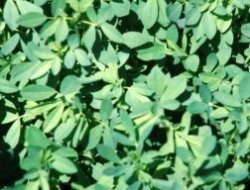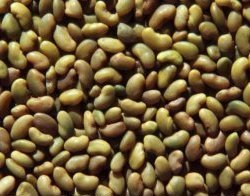Industry Profile - Alfalfa Hay

Sometimes referred to as the "Queen of Forages", the value of alfalfa as feed for livestock was described as early as 490 B.C. by Roman writers. In Manitoba, this value was never forgotten as alfalfa is Manitoba's oldest cultivated forage crop and is certainly one of the most palatable and nutritious. It also produces the greatest amount of protein per acre of any livestock feed. Alfalfa is a herbaceous perennial legume that is rich in protein, vitamins, and minerals, high in energy and low in fibre. Thus, it is prized as a primary component in dairy cattle rations and is an important feed for horses, beef cattle, sheep, and milking goats. Alfalfa is often used in combination with corn silage in livestock rations to take advantage of the protein and energy content of the two feeds. It also can be made into silage, pellets, meal, or cubes.
Manitoba producers have been growing alfalfa since homesteading in the province began. Since this time, producers have been working with researchers, Manitoba Agriculture and Food specialists and each other to increase the quality of Manitoba's alfalfa crop. Each year, various levels of government and other funding partners sponsor several research projects devoted to the betterment of the alfalfa crop and its marketability. This desire to produce the best forages in the world has resulted in the development of programs such as "The Green Gold Program" that assist Manitoba producers to develop top quality forages and innovative cropping practices. Research helps Manitoba producers determine the optimum time to cut and bale their alfalfa, maximizing its nutrient value.
All the hard work of those dedicated to establishing a successful forage industry in Manitoba was realized in October 1999 when a Manitoba producer took home the gold medal in the alfalfa feed competition at the World Dairy Expo. This event, which is hosted annually by the state of Wisconsin, attracts the premier dairy and forage producers from around the world. Winning a medal at this event was a major triumph for the Manitoba Forage industry. However, not to be outdone, Manitoba producers achieved even greater success at the most recent World Dairy Expo (October 2000). A Manitoba producer was named Grand Champion in the First Time Entrant in the Dairy Hay Competition, and seven other Manitoba entrants finished in the top 20 of their competitive classes. It is evident through these successes that Manitoba producers have a growing reputation for producing world class quality alfalfa.
There are several ways that alfalfa is processed in Manitoba. The first involves the processing of alfalfa into pellets or meal. Within Manitoba, Alfalfa Products Ltd (Winnipeg) and Coldstream Alfalfa Processing Ltd (Dauphin) process alfalfa in this way and export the alfalfa meal and pellets to several countries including Germany, Taiwan and the United States. It is, however, the second type of processing, the compaction of hay into bales for export to international markets, which is the larger of the two alfalfa processing industries. Companies involved in hay compaction include Sunridge Forage Ltd (Russell), Lake Winnipeg Hay Co. (Fisher Branch) and Canadian Greenfield Forage (Teulon). As well, many independent Manitoba growers have the facilities and equipment necessary to deliver hay directly to customers in nearby markets. Manitoba currently exports high-quality compacted alfalfa and alfalfa-mix bales to countries such as the United States, the United Kingdom and Japan.

The Manitoba compaction industry is dedicated to ensuring that its products are top quality. Bales are double compressed for ease of shipping to distant locations. The bales are then packed into sealed shipping containers that ensure the moisture content and product quality are maintained during transportation. It is this commitment to high quality standards ensures that the hay is still in excellent condition once it arrives at its destination - retaining the fibre length and feel of freshly baled hay.
The international demand for Manitoba-grown alfalfa is on the rise as overseas farm operations experience the high quality of our product. As well, the word is spreading that Manitoba hay processors have a reputation of being leaders in the forage compaction and forage handling industries, and helping to design the latest compacting, handling and drying equipment. In fact, all those companies operating in the Manitoba compaction industry use equipment that is less than three years old. For further information on Manitoba's alfalfa industry, the following are several contacts associated with the industry.
Links
